Results
Elections in Europe
Pascale Joannin
-

Available versions :
EN

Pascale Joannin
This the tenth European election which was held from 6 to 9 June in the 27 Member States of the European Union shows a certain stability in the choice made by the citizens of Europe, who once again gave their votes and their confidence to candidates from the three main political families: centre-right (EPP), centre-left (PES, S&D) and Liberals (ALDE, Renew)). The outgoing coalition formed by these 3 parties retains a majority of 405 seats. As the only majority coalition, it should therefore be renewed for the new legislature.
Higher Turnout
After an upturn in the 2019 elections, when turnout exceeded the 50% threshold for the first time since 1994 (50.66%), turnout rose again in 2024 to 51.08% in the European Union. This result contradicts the idea that the European elections are of no interest to the public because there are no issues at stake. Of course, there are differences between countries where voting is compulsory and so it rises above 80% (Belgium 89.82% and Luxembourg 82.29%) and in countries where it is below 30% (Croatia 21.35% and Lithuania 28.35%).
No change to the main balance
This tenth European election confirms the dominance of the European People's Party (EPP), which remains the largest group with 190 seats. It won in Germany, Spain, Poland, Greece, Croatia, Finland, Ireland, Bulgaria, Slovenia, Estonia, Latvia, Lithuania, Luxembourg and in Cyprus. The Party of European Socialists (PSE), and its group S&D maintained its second position with 135 seats. It came out ahead in Portugal, Sweden and Malta and also in a coalition in the Netherlands and Romania. Once again, these are the only two groups to exceed the threshold of 100 MEPs. The Liberals of Renew, which exceeded S&D in 2019 (with 102 seats) have lost ground due in particular to the very poor result of Renaissance in France which won 14.6% (compared with 22.42% in 2019) losing 10 seats. Despite this setback, the French delegation is still likely to be the most numerous in this group. The Liberals came out ahead in the Czech Republic and Slovakia. The group is currently holding on to third place with 80 elected members.
With 405 seats, these three groups form the only possible majority coalition, as we wrote earlier this year and in line with our forecasts.
The main political balances that were established in 2019 have been maintained. We might point out that the loss of the absolute majority by the two main groups in 2019 heralded a real change, as those two groups had dominated Parliament since the first elections by direct universal suffrage in 1979. The majority comprised by these three parties since then will continue in power in 2024.
A contained push to the right
Many observers feared a strong surge in radical right-wing, nationalist populist and even extreme parties. They are certainly making progress, but this has been more limited than expected.
In the Conservatives and Reformists (ECR) group, the Fratelli d'Italia (FdI) party of the President of the Italian Council, Giorgia Meloni, came out ahead in Italy with 28.76% (against 6.44% in 2019), which was expected, but this was the only case. Poland's Law and Justice (PiS) came second behind the Civic Coalition (KO) led by Prime Minister Donald Tusk, as did the N-VA in Belgium. In Latvia the National Alliance (NA) came second behind New Unity (JV). Vox came third in Spain with 9.62% far behind the People’s Party (PP) and the PSOE, the Sweden Democrats (SD) were positioned only fourth after coming second in the most recent national general election in 2022, and the True Finns, members of the government, finished sixth with 7.6%. So, this was no landslide.
In the Identity and Democracy (ID) group, Geert Wilders' PVV failed to repeat the feat of finishing first that it achieved in the Dutch general election of 22 November 2023. It was beaten by the Left-Green coalition. In Belgium, Vlaams Belang edged out the N-VA by a hair's breadth... which supplanted it in the federal parliament, for which general elections were held on the same day. The Italian Lega, which was the group's main delegation in the outgoing parliament, witnessed a sharp setback in its results. These plummeted from 34.26% in 2019 (22 elected members) to 8.98% (8 elected members. In Portugal, Chega came third with 9.79%. Again, this was no sweeping victory.
Apart from Belgium, only two other countries witnessed a party from this group come out in first place. In Austria, the FPÖ obtained 25.4% of the vote, but was tailed by Chancellor Nehammer's ÖVP (EPP) with 24.5% and above all France, where the Rassemblement National (RN) surpassed the 30% threshold (31.37%), beating Renaissance by more than double the number of votes.
Uncertainties over the support of elected representatives from new parties and non-attached members
Among the non-attached Members, one of the largest delegations is that of Viktor Orban's Fidesz in Hungary since its departure from the EPP group in 2021. It still took the lead with 44.81%, but was finally 8 points (52.56%) and 2 seats down on 2019. Will Fidesz want to join one of the existing groups? Its position on Russia and Ukraine does not seem to bring it much closer to the line defended by Giorgia Meloni or the PiS in the ECR, but rather to that promoted by the RN.
In Germany, the AfD, which has taken its place in the European Parliament after being expelled by the members of the ID group last May, came second with 15.9%. Its list leader Maximilian Krah, whose comments were at the root of the expulsion from the ID group, was expelled on 10 June by the party authorities, who have refused to allow him to sit among them. Will this expulsion result in the AfD returning to the ID group?
We shall find out when the group is constituted at the end of June.
Where will the 8 elected members of the 5-Star Movement (M5S) in Italy, who secured 9.98% of the vote, go?
Prime Minister Robert Fico's SMER in Slovakia did not come out ahead. Will its 5 MEPs remain as non-attached Members or will they be tempted to form a new group? For this to happen, 23 MEPs from 7 Member States need to join forces.
Among the many MEPs who will not be attached to a group, which the European Parliament estimates at 44, i.e. as many as the number of non-attached Members to date (45), it is not impossible that some, who would not be tempted to join an existing group, will try to form a one of their own, for example the Bündnis Sahra Wagenknecht in Germany, which garnered 6.2% and 6 MEPs, in order to obtain the resources and speaking time that go with it.
The decline of the Greens
Although the Greens are the fourth largest group in the outgoing Parliament with 71 MEPs, the Green Deal was one of the priorities of the current legislature and climate change remains a topical issue, they did not repeat their score of 2019. While they came second in Finland and led in the Netherlands in a coalition with the Socialists, they came fourth in Germany, and in France they managed in extremis to exceed the 5% threshold (5.47%), losing 8 points compared to 2019. At European level, they lost almost 20 seats and currently have 52 seats.
France — stands apart
The results in France, contrary to what happened elsewhere in the neighbouring countries or with its European partners, places it in a peculiar position. This has led to an unprecedented political situation in France. In an address on the evening of 9 June, the French President, drawing the consequences of this result, decided to dissolve the National Assembly (the lower house of the French parliament). This is the first time that the results of the European elections have had such an impact on French political life, despite the fact that on several occasions the parties in government have found themselves in difficulty in these polls. There will be legislative elections on 30 June and 7 July.
This situation has already led to a number of dramatic changes in direction within French political parties. On the left, the parties, divided during the European elections and despite their differences, have agreed for electoral purposes on a union between the PS (S&D), the Greens, LFI (GUE/NGL) and the Communist Party called the New Popular Front. On the right, the president of the Républicains (LR), a member of the EPP, announced an alliance with the RN (ID) on 11 June without consulting his party’s executive, who unanimously dismissed him the next day.
What will the EPP do if LR MEPs are elected with the support of the RN or join its ranks?
This rapprochement is completely at odds with the party line. As a result, some LR members have decided to form an alliance with moderate parties, including the presidential majority, in an attempt to counter extremism on the right and left.
This political crisis is having repercussions on the financial markets. France's CAC 40 index lost more than 6% in the wake of the dissolution of the National Assembly, dragging down other European markets along with it.
Since the announcement, France's image appears to have been damaged and its influence, particularly within the Council, could suffer as a result of the legislative vote.
Consequences for the Commission Presidency and appointment to the top jobs
The European People's Party is still by far the largest group and can lay claim to the presidency of the Commission. Last March, it nominated the outgoing President of the European Commission, Ursula von der Leyen, as head of its list for a second term. This time, unlike in 2019, she has secured the support of her party in Germany, the CDU, and that of the EPP.
As the first female president, she can draw on the experience she has acquired over the last five years, although she might be criticised. Her candidacy must be "proposed" by the European Council, which will meet informally on 17 June, followed by a summit on 27 and 28 June. This will be the first step in appointing the top jobs at European level. Given the results, the PSE would like to have the Presidency of the European Council; the name of former Portuguese Prime Minister Antonio Costa has been mentioned; and Renew, has its eyes on the post of High Representative for Foreign Affairs; the name of Estonian Prime Minister Kaja Kallas has regularly been mentioned. Since the war in Ukraine, it seems to be a given that one of these positions will be go to a country of Central and Eastern Europe.
To this end, Ursula von der Leyen is campaigning to collect a majority of votes (361) in the European Parliament at the next plenary session in Strasbourg (16-19 July). The date of 18 July has been suggested for this vote, so that the appointment of commissioners and their hearings by parliamentary committees in the autumn are not delayed or postponed.
In 2019, when she was appointed by the European Council to replace the candidate nominated by the EPP, she obtained only a narrow majority of 9 votes. It should be different this year, even if she has to campaign to make up for possible defections from her own camp.
It is hard to see what credible alternatives might emerge, as this could disrupt an already very tight timetable for her to take office by the end of the year. Europe needs to be up and running if it is to meet and overcome the many challenges that it faces, from within and also on the international stage.
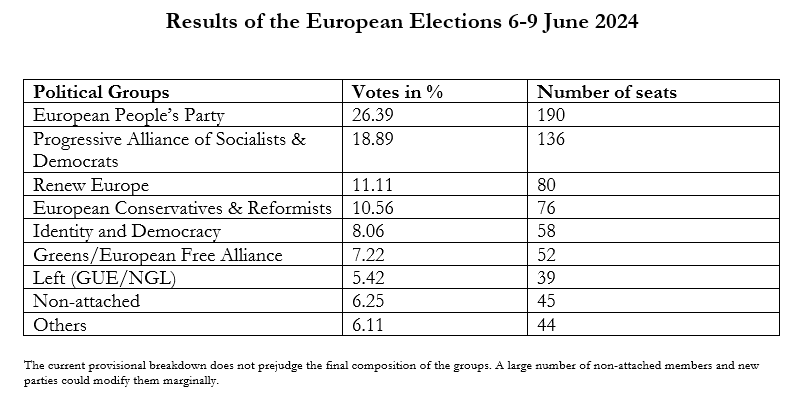
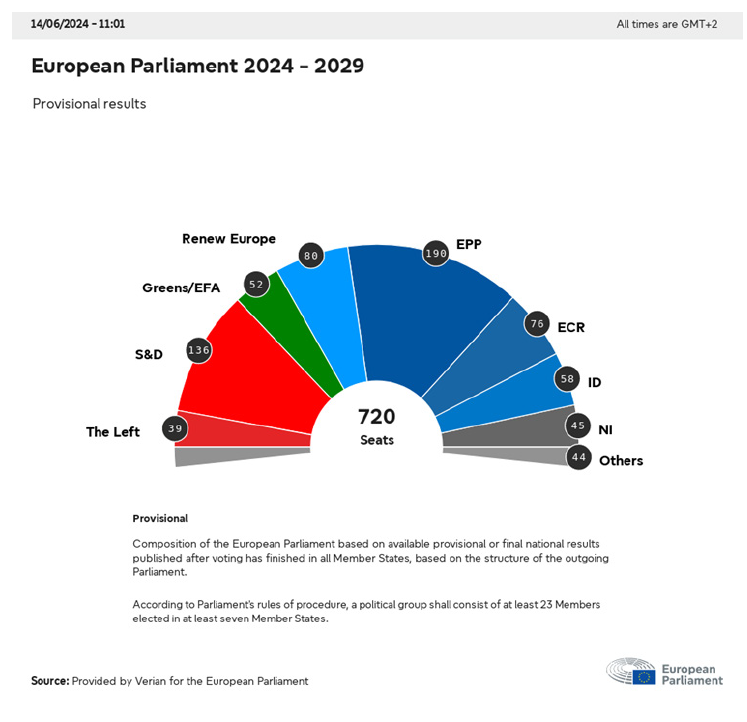
***
Annexes
AUSTRIA
20 SEATS
https://2024.electionseuropeennes.eu/autriche/
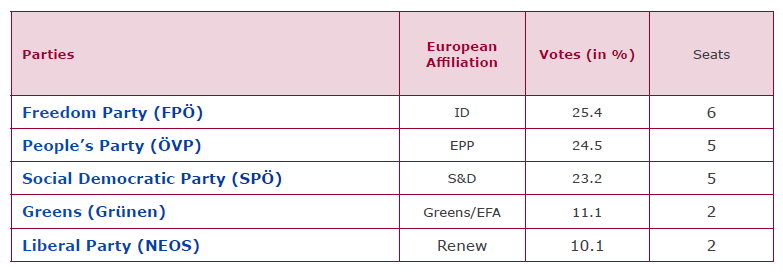
BELGIUM
22 SEATS
https://2024.electionseuropeennes.eu/belgique/
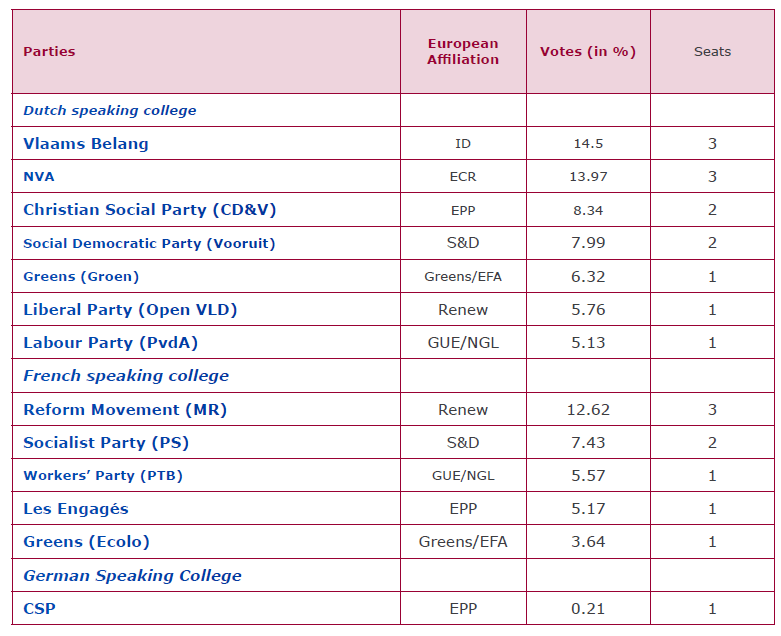
BULGARIA
17 SEATS
https://2024.electionseuropeennes.eu/bulgarie/
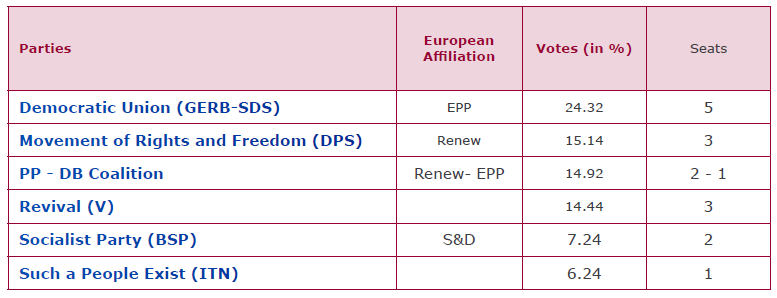
CROATIA
12 SEATS
https://2024.electionseuropeennes.eu/croatie/

CYPRUS
6 SEATS
https://2024.electionseuropeennes.eu/chypre/
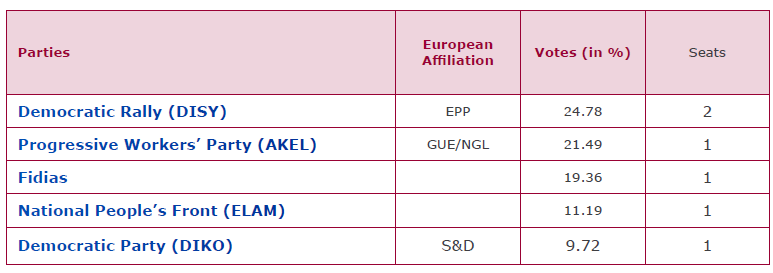
CZECH REPUBLIC
21 SEATS
https://www.electionseuropeennes.eu/en/czech-republic
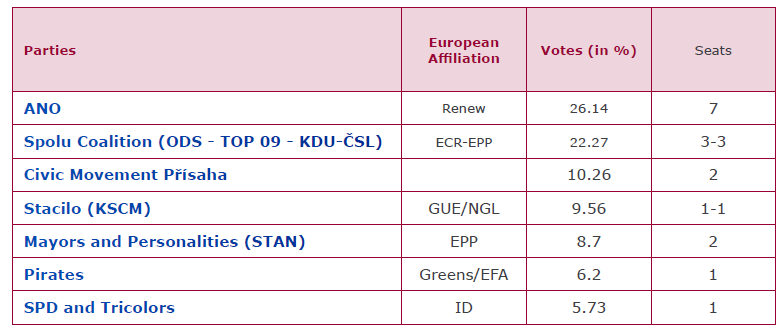
DENMARK
15 SEATS
https://2024.electionseuropeennes.eu/danemark/
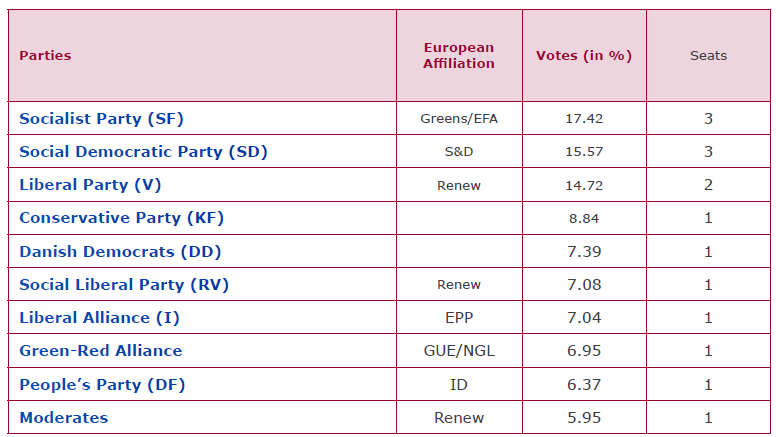
ESTONIA
7 SEATS
https://2024.electionseuropeennes.eu/estonie/
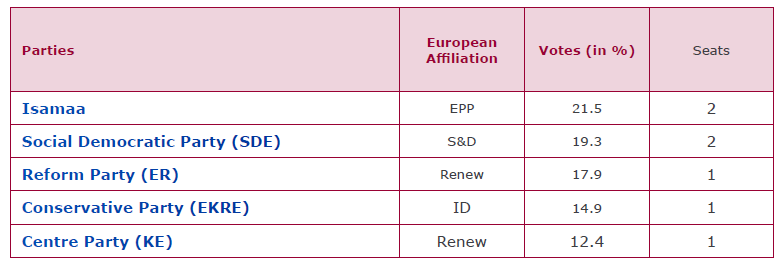
FINLAND
15 SEATS
https://2024.electionseuropeennes.eu/finlande/
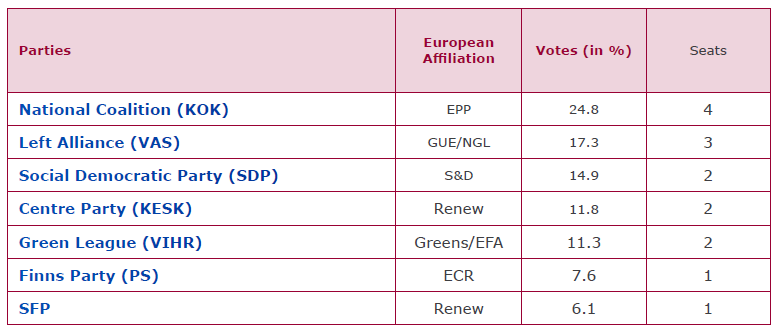
FRANCE
81 SEATS
https://2024.electionseuropeennes.eu/france/
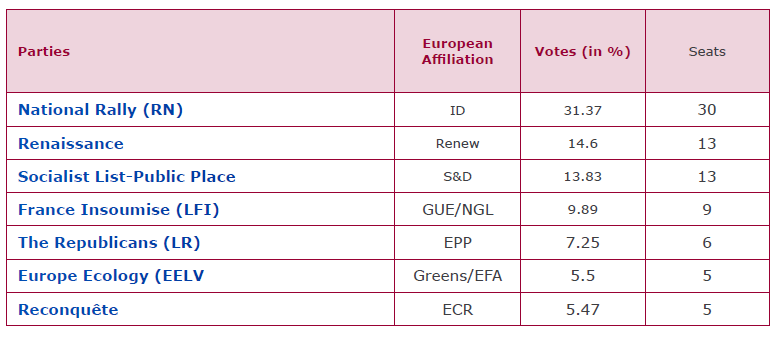
GERMANY
96 SEATS
https://2024.electionseuropeennes.eu/allemagne/
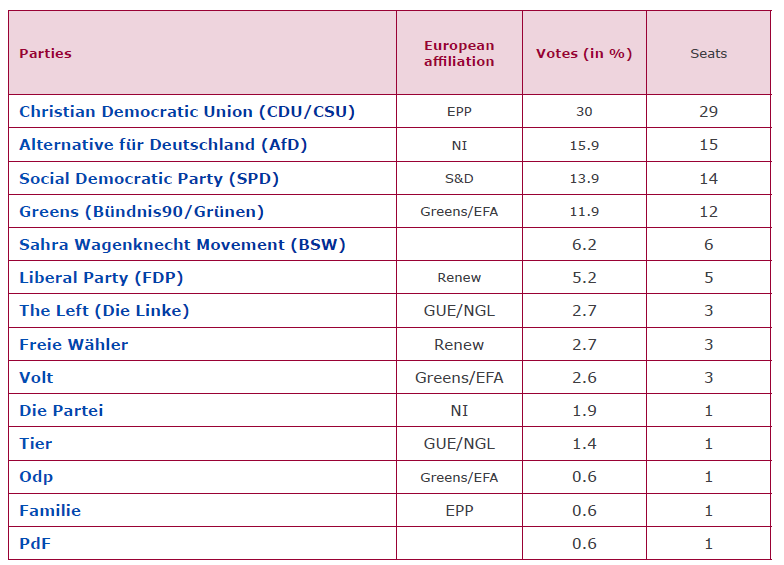
GREECE
21 SEATS
https://2024.electionseuropeennes.eu/grece/
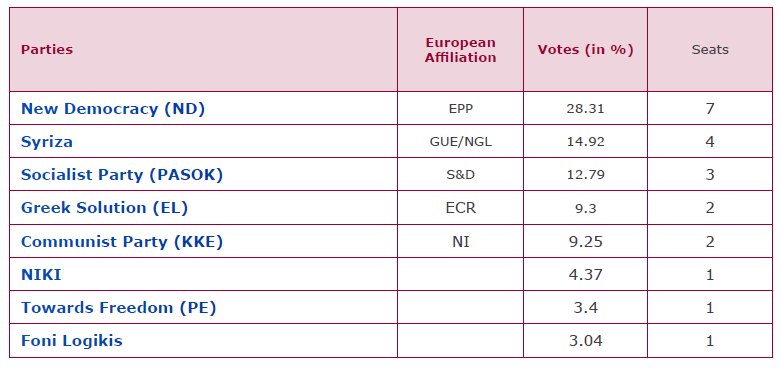
HUNGARY
21 SEATS
https://2024.electionseuropeennes.eu/hongrie/

IRELAND
14 SEATS
https://2024.electionseuropeennes.eu/irlande/
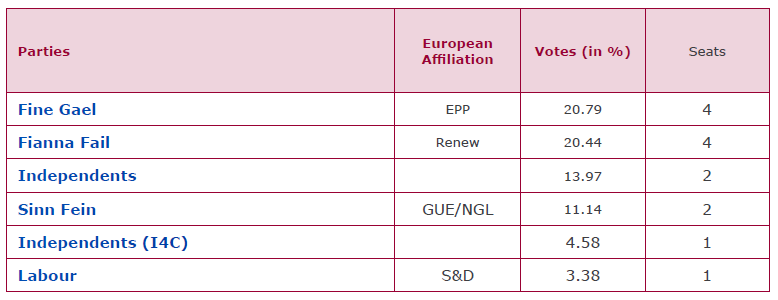
ITALY
76 SEATS
https://2024.electionseuropeennes.eu/italie/
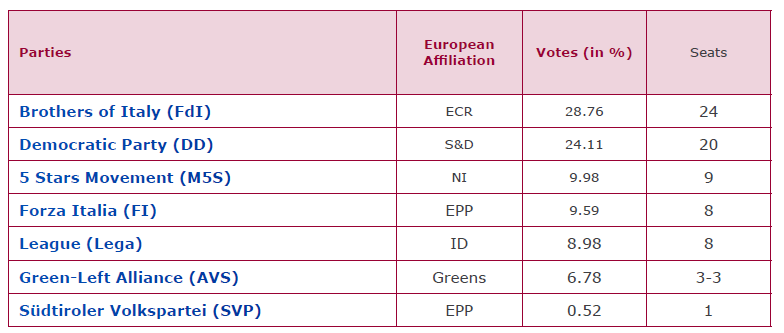
LATVIA
9 SEATS
https://2024.electionseuropeennes.eu/lettonie/
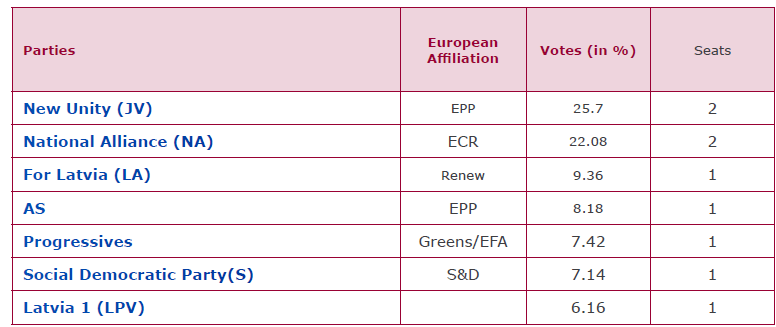
LITHUANIA
11 SEATS
https://2024.electionseuropeennes.eu/lituanie/
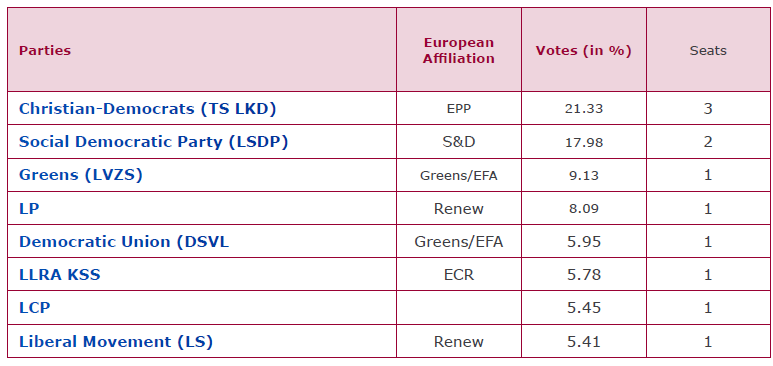
LUXEMBOURG
6 SEATS
https://2024.electionseuropeennes.eu/luxembourg/
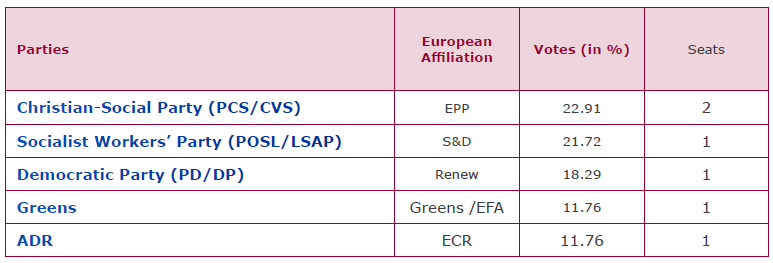
MALTA
6 SEATS
https://2024.electionseuropeennes.eu/malte/

NETHERLANDS
31 SEATS
https://2024.electionseuropeennes.eu/pays-bas/
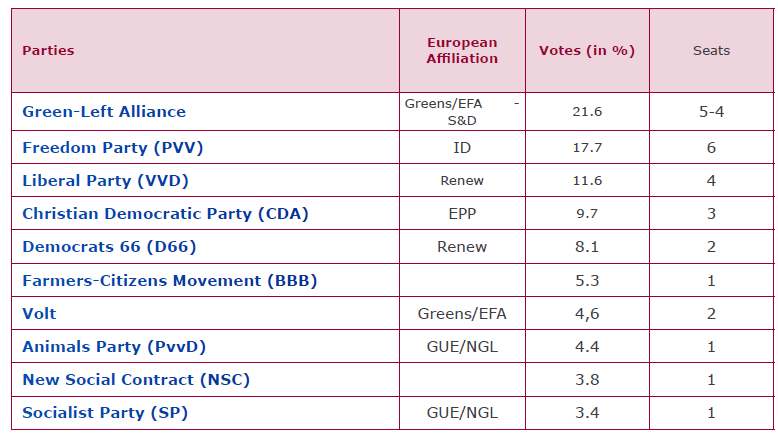
POLAND
53 SEATS
https://2024.electionseuropeennes.eu/pologne/
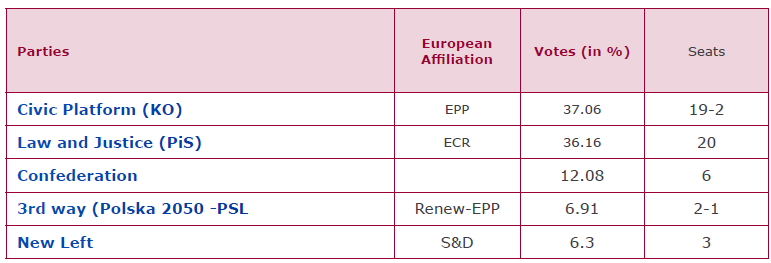
PORTUGAL
21 SEATS
https://2024.electionseuropeennes.eu/portugal/
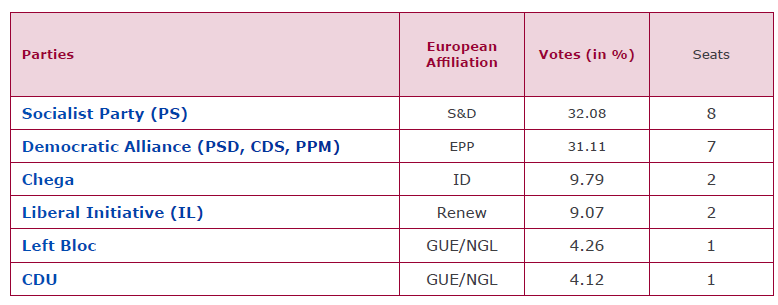
ROMANIA
33 SEATS
https://2024.electionseuropeennes.eu/roumanie/
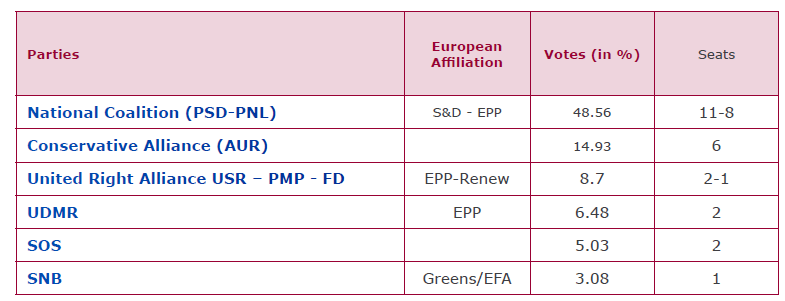
SLOVAKIA
15 SEATS
https://2024.electionseuropeennes.eu/slovaquie/
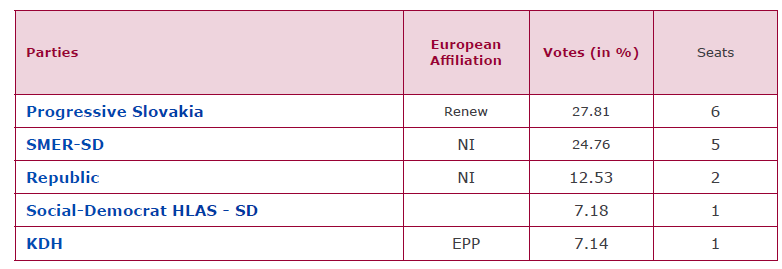
SLOVENIA
9 SEATS
https://2024.electionseuropeennes.eu/slovenie/
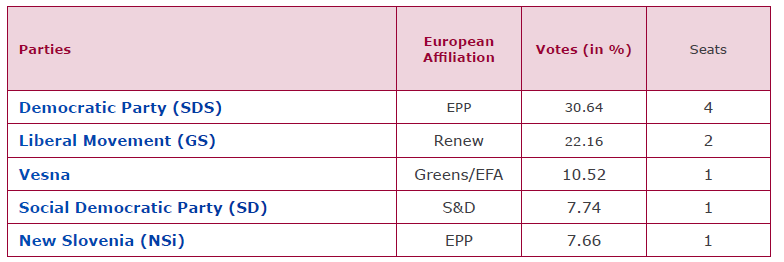
SPAIN
61 SEATS
https://2024.electionseuropeennes.eu/espagne/
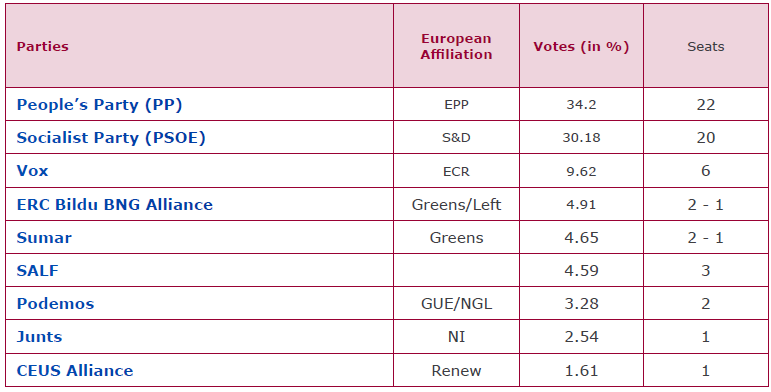
SWEDEN
21 SEATS
https://2024.electionseuropeennes.eu/suede/
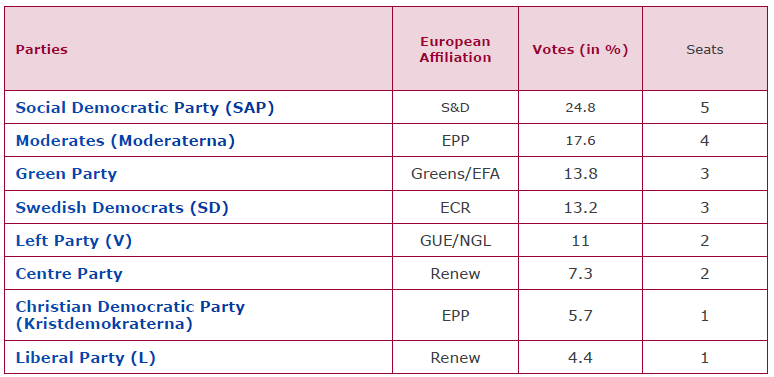
On the same theme
To go further
Elections in Europe
Corinne Deloy
—
25 February 2025
Elections in Europe
Corinne Deloy
—
18 February 2025
Elections in Europe
Corinne Deloy
—
28 January 2025
Elections in Europe
Corinne Deloy
—
14 January 2025

The Letter
Schuman
European news of the week
Unique in its genre, with its 200,000 subscribers and its editions in 6 languages (French, English, German, Spanish, Polish and Ukrainian), it has brought to you, for 15 years, a summary of European news, more needed now than ever
Versions :



